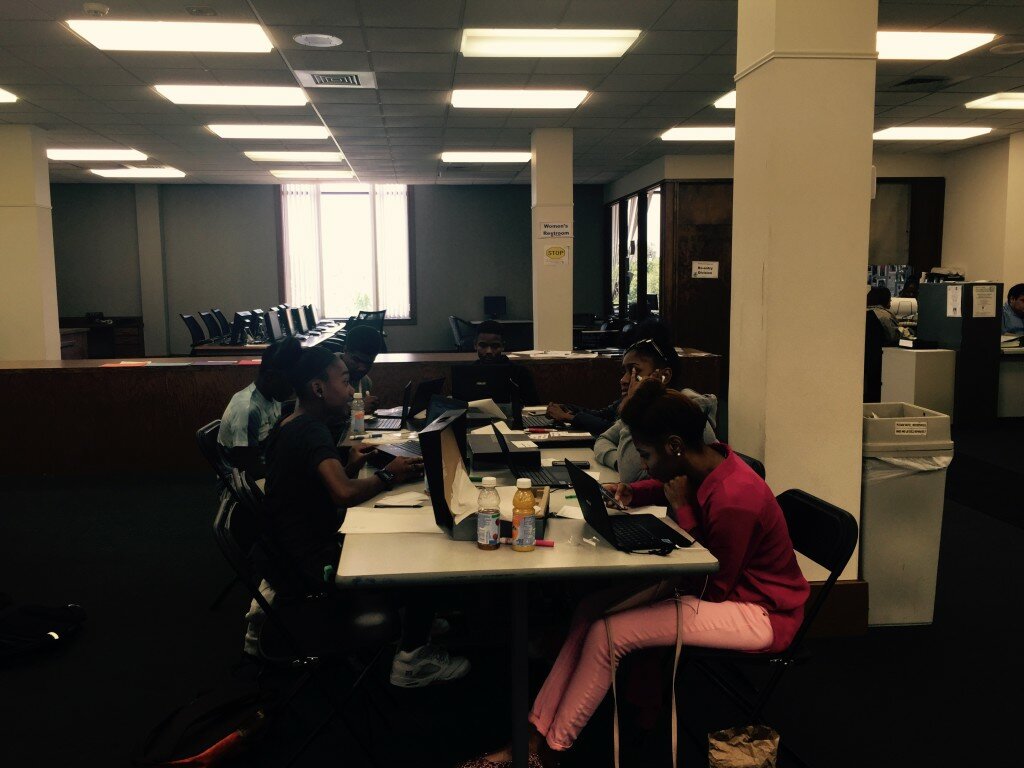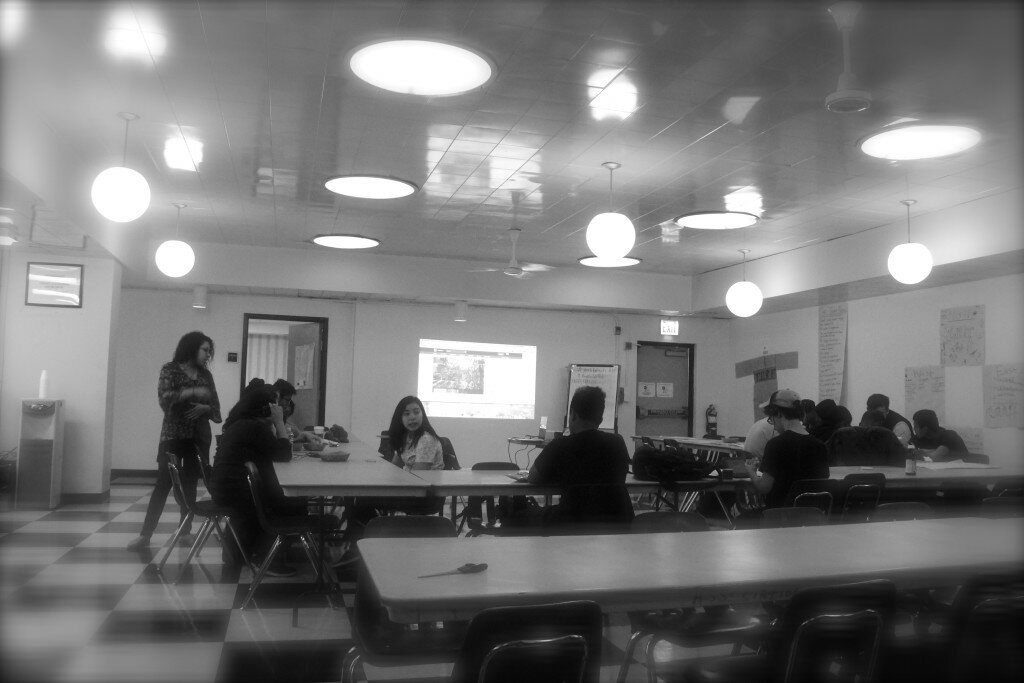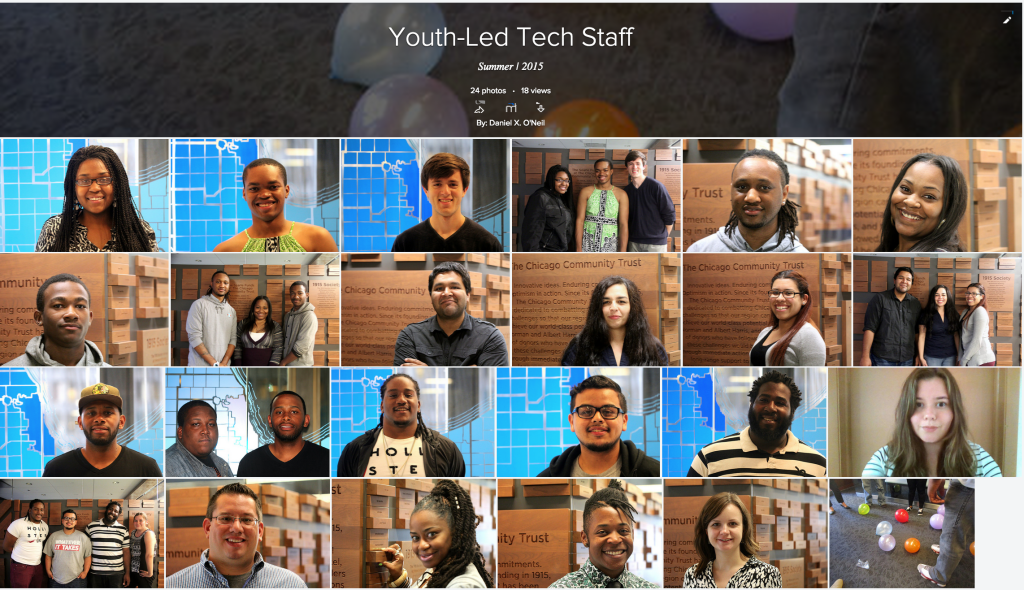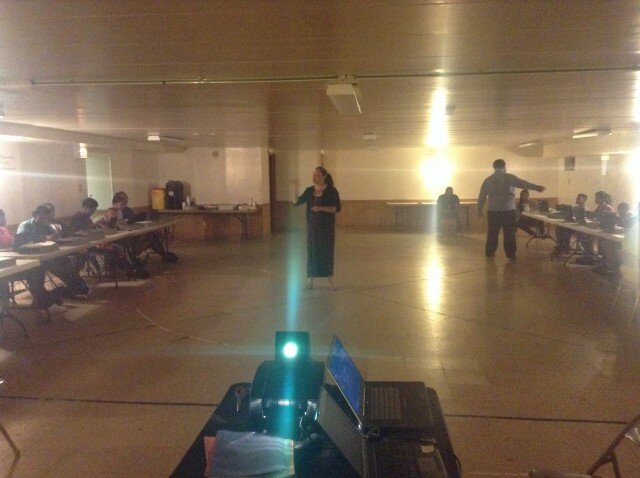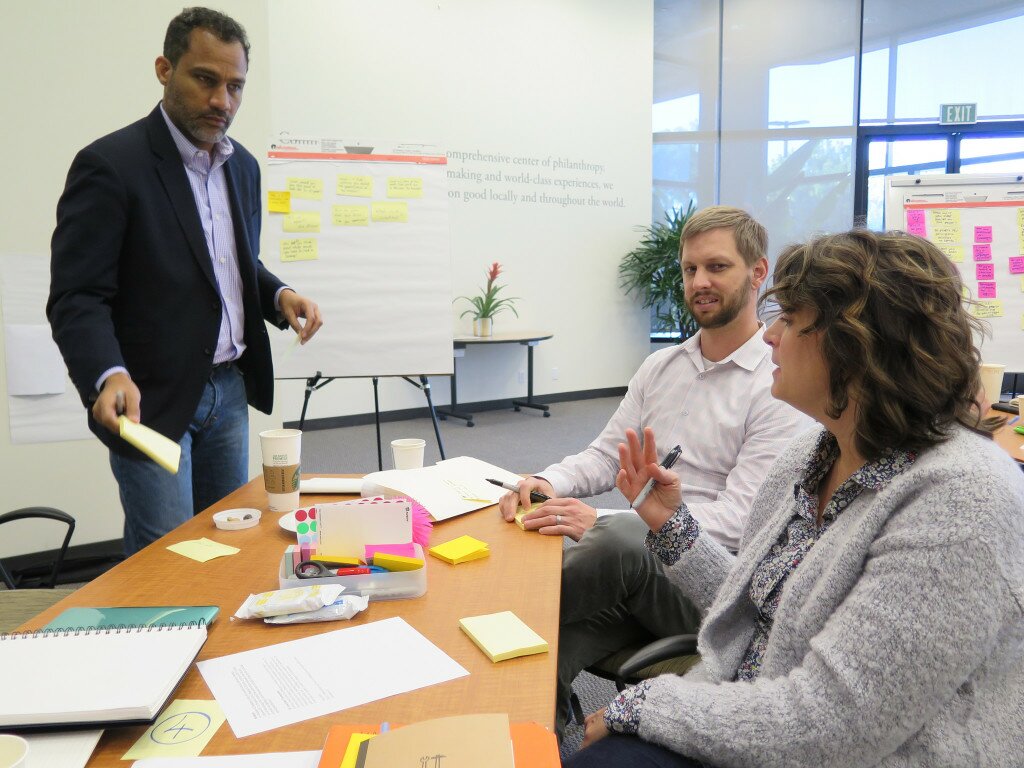We like to have fun in the sun
Everyday is a gift because its a blessing to live
I love everyone and its crazy because a lot of kids are getting killed.
Its alot of talented people in englewood that they just have to prove their self.
Many don’t have a chance to reach their own goal.
Ancestors of ours are screaming from the grave cus physically were free but were still mental slaves.
Live a life of love.
Happy souls live.
freedom is a curse or a blessing.
we are happy to show our talents.
carpe diem.
life is a gift and everybody deserves a second chance.
you only live once
Together were trying to make it out this community but first we have to come together with unity.
so come together and do something good for the community.
you can’t change englewood you can only change the people in it.
live life to the fullest.
perfection is not attainable but if we chase perfection we can accomplish our goals and dreams.
this is a youth led tech program where everyone is welcome so don’t sit around make yourself welcome.#godsgift
If we are God’s gift, not to be taken.
we got to stay together we gotta stay golden we have to have trust before our trust is stolen.
This is smart chicago we stand as a family.
For all those who take life I hope their souls are forsaken.
Author: admin
Found Poem (Odd Squad)
I have to
there can be no surprises,
empathetic disrupters.
Are we writing this?
For the girls?
I want to be cared for; exceptional.
The odd monkey.
In my home.
In the wilderness.
There’s always someone who should have been there.
Give us meat that we may eat.
With a bang.
Copyright 2015 Humboldt Park Odd Squad
Sourcing Instructors for Youth-Led Tech
We’re in the second week of delivering on our inaugural Youth-Led Tech, and one of the most rewarding parts of running this program is working with our instructors. We assembled a stellar group of people in a very short amount of time.
At Smart Chicago, one of our principles is open. To us, that means publishing open source code, but it also means publishing step-by-step instructions on how we do less technical but often more sophisticated tasks like hiring a high-quality, diverse workforce for tech instruction in a short amount of time.
Here’s how we did it:
We opened the application process on May 15, 2015 and closed it on June 4, 2015 at 8AM. The main instrument was through text on the project page. We promoted the positions via Twitter, email, Facebook, and other means.
On May 26, 2015, we had 36 applications, 3 of which were duplicates. We sent out this Mailchimp email to all 36 applicants, inviting them for interviews
We conducted 15 interviews on June 2, 2015 based on responses to this campaign. As three of us did the interviews— Kyla, Sonja, and I— we collected quantitative and qualitative information in another Wufoo form. We asked general, open-ended questions about why they were interested in the opportunity, and also checked their availability for the six-week course. We also gave each a rating in three areas: classroom management, tech knowledge, and teaching experience.
An additional nine people applied after this initial interview set. We arranged and conducted another 12 interviews with a number of these applicants, as well as people from the initial 36 who couldn’t make it on June 2. We communicated with these people by email rather than Mailchimp. We offered interviews to every applicant, and we interviewed everybody who responded to our offers.
We received 45 applications total. After background checks, consent forms, and consultant contracts, we hired this set of wonder-people:
Week One News You Can Use from Youth-Led Tech
Here’s an excerpt from our first newsletter for this summer program. If you’d like to get this to yer Inbox, sign up here.
Our first Youth-Led Tech program is off to a great start. This is our first weekly update made especially for the youth, parents, guardians, counselors, instructors, and everyone else who cares https://slack-files.com/files-tmb/T06U90JBB-F073DMAF7-ddc6f54633/slack_for_ios_upload_1024.pngabout the people in Youth-Led Tech. If you know someone who should be getting these emails, tell them to fill out this form.
Time to sign up is running out
For anyone still thinking about signing up for this program, the time is now. We are making a final push for enrollment and we need all eligible youth to sign up here. Visit the project page for full program information.
Keep in mind that this program is supported by Get IN Chicago and is run by theSmart Chicago Collaborative. Get IN Chicago has 18 target populations and communities and we can only serve students who come from those specific communities. You can see a complete map of these communities here.
You can determine eligibility by finding neighborhood names using this tool maintained by the Chicago Tribune. If you have questions, comments, or issues about an application that has been declined, please contact me directly at the information below.
What we’re learning
This week we’ve focused on lots of startup activities— forms, figuring out meals we all like, getting computers set up, doing team-building, and (yes) even starting to learn how to make websites. One of our principles at Smart Chicago is openness— we love to share exact details of what we do and how we do it. Here’s the complete curriculum for our first week: Day One, Day Two, Day Three, Day Four, Day Five.
The instructors at each location go at their own pace, add their own flavor, and respond to youth input, so there may be differences between this curriculum and what the youth are learning so far in your location. Please download, share, and try this out at home— even if you can’t make it to our sessions this summer, we hope you can get value out of our work.
City of Chicago Tech Plan Update
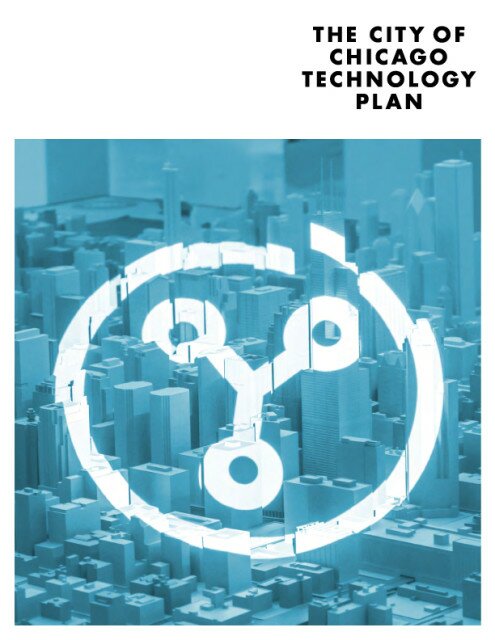 At Techweek, City of Chicago Chief Information Officer Brenna Berman announced an 18-month update to Chicago’s Tech Plan.
At Techweek, City of Chicago Chief Information Officer Brenna Berman announced an 18-month update to Chicago’s Tech Plan.
Chicago’s first Tech Plan was first launched in 2013 and laid out a strategy to establish Chicago as a national and global center of technological innovation.
Since it’s launch, Chicago’s civic technology community has made significant progress towards the goals of the tech plan.
As a civic organization devoted to improving lives in Chicago through technology, Smart Chicago is proud to be heavily involved in the implementation of Chicago’s Tech Plan.
Here are some highlights from the update.
Next Generation Infrastructure
Chicago is working with internal and external partners to improve the speed, availability, and affordability of broadband across the city. The City is preparing to create a Request for Proposal for companies to design, construct, implement, and manage a gigabit-speed broadband network.
In addition to broadband infrastructure, the city is also working to digitally connect it’s infrastructure. Part of this includes the launch of The Array of Things project which will place network of interactive, modular sensor boxes around Chicago collecting real-time data on the city’s environment, infrastructure, and activity for research and public use. (You can listen to their presentation at Chi Hack Night here.) You can already get up to the hour updates on beach conditions thanks to sensors maintained by the Chicago Park District. The Department of Innovation and Technology has loaded the information onto their data portal.
Make Every Community a Smart Community
One of the major efforts of the civic technology community in Chicago is closing the digital divide in every neighborhood.
Much of the work in the coming months will focus on Connect Chicago. This citywide effort, led by Smart Chicago in partnership with LISC Chicago, Chicago Public Library, World Business Chicago, and the City of Chicago’s Department of Innovation and Technology aligns citywide efforts to make Chicago the most skilled, most connected, most dynamic digital city in America.
Here’s more from the Tech Plan about the program:
As part of this initiative, program partners are creating a profile of a fully connected digital community that can be used as a benchmark and will provide best-practice toolkits and other resources to help all Chicago communities reach this benchmark.
If you’re interested in getting involved in – you should reach out or join the Connect Chicago Meetup!
Another big part of the City’s strategy to close the digital divide in Chicago involves the Chicago Public Library. Libraries around the city already function as public computing centers and now they provide Internet to Go – a program where residents can check out laptops and 4G modems so that they can access the internet at home.
The City of Chicago and the civic tech community is also heavily focused not only access, but on digital skills. The Chicago Public Library’s Cybernavigator Program is set to be expanded and Chicago Public School is working on implementing computer science curriculum at all schools.
On our end, Smart Chicago is working with Get In Chicago to run a youth-led tech program this summer. The conceptual model for this program is “youth-led tech”, which means teaching technology in the context of the needs & priorities of young people. Youth will learn how to use free and inexpensive Web tools to make websites and use social media to build skills, generate revenue, and get jobs in the growing technology industry. They will also learn about all sorts of other jobs in tech— strategy, project management, design, and so on.
Effective Government
The City of Chicago’s Department of Innovation and Technology is also making great progress in using data to help city government be more efficient and effective. One of their first projects, WindyGrid, is a geospatial Web application designed by the City’s Department of Innovation and Technology that strategically consolidates Chicago’s big data into one easily accessible location. WindyGrid presents a unified view of City operations—past and present—across a map of Chicago, giving City personnel access to the city’s spatial data, historically and in real time, to better coordinate resources and respond to incidents.
The City of Chicago will be open sourcing the project later this year on their Github page.
That’s not the only open source project that the city has on the books. Chief Data Officer Tom Schenk Jr recently spoke at Chi Hack Night to talk about their new system to predict the riskiest restaurants in order to prioritize food inspections. The system has found a way to find critical food safety violations seven days faster. Aside from the important aspect of less people getting sick from foodborne illness in the City of Chicago, there is another very important aspect of this work that has national impact. The entire project is open source and reproducible from end to end.
Since the release of the Tech Plan, Smart Chicago has been working with the Chicago Department of Public Health on the Foodborne Chicago project. Foodborne listens to Twitter for tweets about food poisoning and converts them into city service requests. The Tech Plan update has some results from the project.
A study of the system, published by the Centers for Disease Control, found that during March 2013 – January 2014, FoodBorne Chicago identified 2,241 “food poisoning” tweets originating from Chicago and neighboring suburbs. The complaints identified 179 Chicago restaurant locations; at 133 (74.3%) locations, CDPH inspectors conducted unannounced health inspections. A total of 21 (15.8%) of the 133 restaurants reported through FoodBorne Chicago failed inspection and were closed; an additional 33 restaurants (24.8%) passed with conditions, indicating that serious or critical violations were identified and corrected during inspection or within a specified timeframe.
Chicago’s open data portal is also getting expanded as part of the updated Tech Plan having grown by more than 200 data sets over the last two years. Chicago was the first City to accept edits to select data sets through the City’s GitHub account.
Open311 is also getting an upgrade with the city undergoing a procurement processes to build a new 311 system. As part of the process for upgrading 311, the new system will go through user testing through the Civic User Testing Group.
Civic Innovation
A big part of the city’s strategy around civic innovation is supporting the work of civic technologists here in Chicago. As part of the Tech Plan, Smart Chicago will continue to provide resources to civic technologists like developer resources, user testing, and financial support to civic technology projects.
The Tech Plan also calls out our work with the Chicago School of Data. The two day experience was wholly based on the feedback we received from dozens of surveys, months of interviews, and a huge amount of research into the work being done with data in the service of people. If you missed the conference, here are some of the key takeaways.
The Civic User Testing Group also plays a part in the Tech Plan and has recently been expanded to include all of Cook County.
Chicago Chief Information Officer Brenna Berman stated that Chicago has the strongest civic innovation community in the country. A large part of that community has been the Chi Hack Night, now in it’s fourth year with attendance now reaching over 100 people regularly.
Technology Sector Growth
One of the most thorny issues for civic technologist is the issue of government procurement. One of the things that the city has been doing is meeting with different groups to talk about ways the city can make it easier to buy products and services from smaller business and startups. (You can see Brenna Berman’s talk at the OpenGov Chicago Meetup here.)
As part of the Tech Plan, the City of Chicago is taking this on directly. Here’s the quote from the Tech Plan:
This summer, DoIT will release a Request for Qualifications for start-up and small-sized companies to join a new pool of pre-qualified vendors eligible for future City procurement opportunities. Companies who are deemed qualified will be placed into a pool and receive access to City contract opportunities in the areas of software application development and data analytics.
To further decrease the barriers facing smaller-sized companies in competing for City business, the City has modernized its insurance requirements to allow for pooled insurance plans. Start-ups that are members of an incubator, such as 1871, or smaller companies that come together for a group insurance plan, may now meet the City’s insurance requirements as a group. Insurance requirements were identified as a barrier to conducting business with the City in a series of listening sessions conducted over the past year with these companies.
This is a huge opportunity not only for civic tech companies, but it will enable the city to take advantage of the innovation coming out of these companies.
Denise Linn Joins Smart Chicago as Program Analyst
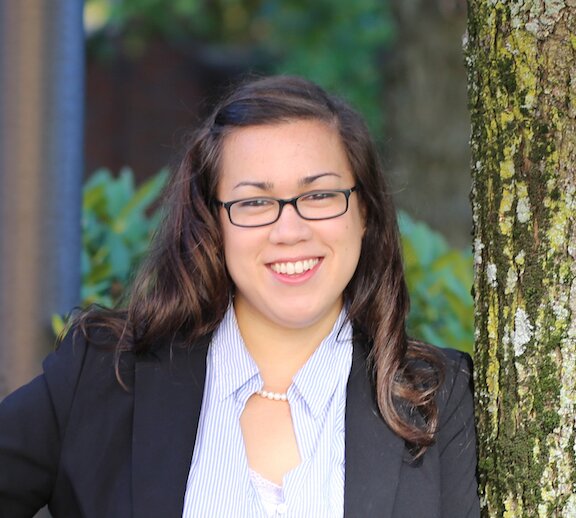 Today Denise Linn joins the Smart Chicago Collaborative as the Program Analyst. She will manage citywide ecosystem initiatives like Connect Chicago and the Chicago School of Data.
Today Denise Linn joins the Smart Chicago Collaborative as the Program Analyst. She will manage citywide ecosystem initiatives like Connect Chicago and the Chicago School of Data.
Denise comes to us from the Harvard Kennedy School, where she completed her Master in Public Policy degree and researched civic innovation and city-level Internet access projects. In 2015, she published “A Data-Driven Digital Inclusion Strategy for Gigabit Cities” and co-wrote the “Next Generation Network Connectivity Handbook.” She previously worked as an Economics Research Assistant in the Auctions & Spectrum Access Division of the Federal Communications Commission and is an alumna of the AmeriCorps VISTA program.
As Program Analyst, Denise will develop, execute, and manage the evaluation of Smart Chicago Programming. She has primary responsibility for the day-to-day activities of Connect Chicago, the Chicago School of Data, and other data engagement projects like the Array of Things and the National Neighborhood Indicators Partnership.
You can follow her work on Twitter, LinkedIn, and Slideshare.
Please join me in welcoming Denise Linn.
This week in Chicago Civic Tech Events: Cook County, Court Data and more
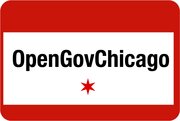 This week we’ve got three civic tech events happening in Chicago.
This week we’ve got three civic tech events happening in Chicago.
Cook County at Chi Hack Night
Tuesday at 6:00pm at Braintree (8th floor of Merchandise Mart)
Cook County employees will be presenting at Chi Hack Night about their progress in opening up county data.
Representatives across several of Cook County’s 65 agencies will give a quick overview of their data, where it lives and who’s in charge of it.
We’ll be hearing from:
- Andrew Schwarm, Cook County Chief Performance Officer
- Derrick Thomas, Director of Application Development and Management for the Cook County Bureau of Technology
- Poh Png, Director of IT for the Cook County Clerk’s Office
- Donna Hart, Director of Information Systems at the Cook County Health and Hospitals System
Afterwards, they will take your questions and hear your open data wish lists.
The Smart Chicago Collaborative has a partnership with the Cook County Bureau of Technology to assist them in the creation and publication of open data in the context of the County’s Open Government Plan Ordinance and Open Government Plan. Our consultant Josh Kalov has been working with Cook County to open up Cook County data for the past year and a half.
You can RSVP for the event by clicking here.
OpenGov Chicago: Local Court Data
Wednesday at 6:00 PM at the Chicago Community Trust (225 N Michigan, 22nd floor)
At the next meetup, OpenGov Chicago will cover the Chicago Justice Project’s (CJP) ongoing engagement with the Office of the Chief Judge of the Circuit Court of Cook County, Timothy Evans.
CJP’s engagement is seeking to open access to all the data created by the Court since they started collecting the data in the 1980s (the courts have told CJP they started collecting data either in 1980 or 1988). This means that when approved CJP would receive about 30 years of Court data. CJP requested all the data maintained by the Clerk’s Office on each criminal case filed, appropriately de-identified. CJP is seeking an agreement that would require regular updates of court data be released on an ongoing basis moving forward removing all the current barriers to this data.
The evening will also cover the results of Smart Chicago’s recent PACER postcard campaign, where we helped send dozens of postcards to Chief Judge Ruben Castillo of the United States District Court of the Northern District of Illinois, asking him to look into issues with PACER , the system run by the federal judiciary that provides access to court dockets.
You can RSVP for OpenGov Chicago here!
Technology, Government, and the Public Good Panel Discussion
Wednesday at 6:00pm at General Assembly: After World Books (23 E Illinois Street)
Curious what civic tech is all about? General Assembly will be hosting an expert panel on the growth of collaboration between government and technology in Chicago and how these two industries are working together to serve and support the public good. Learn more about the various innovative initiatives happening in the Chicago area, and how you can get involved to support the community, no matter your experience. Whether you’re a techie or not, the panel will discuss how everyone can contribute to civic engagement.
The panel is made up of Chicago Chief Data Officer Tom Schenk Jr, Datamade/Chi Hack Night Founder Derek Eder, Evanston Digital Services Coordinator Luke Stowe, mRelief Founder Rose Afriyie, and our own consultant Christopher Whitaker.
On Open Data + Mass Joy at the Personal Democracy Forum
Last week I spoke at the Personal Democracy Forum about the Jackie Robinson West Little League baseball team, open data, and what we should do as practitioners of civic tech and members of society.

Here’s a video:
And here are the notes I used for the talk:
Yesterday morning here at PDF, we heard, for the first time I can remember in the world of civic tech, a lot about the workers and the masses. Specifically, the morning sessions around Civic Tech and Powerful Movements:
Reckoning With Power
Eric LiuCreative Collision: How Business and Social Movements Will Reshape Our Future
Palak ShahPutting Labor in the Lab: How Workers Are Rebooting Their Future
Carmen RojasLabor Codes: The Power of Employee-Led Online Organizing
Jess KutchPowerful Platform, Powerful Movements
Dante BarryThe Net as a Public Utility
Harold Feld
In the summer of 2014, in the city of Chicago, Illinois, a youth baseball team called Jackie Robinson West came out of nowhere (well, at least according to the vast millions of Chicagoans who don’t follow such things) to compete for the World Championship in the Little League Baseball World Series.
It was a team of African-American kids from Chicago’s South Side, and they competed and won at the highest levels. They beat some kids from Las Vegas to play for world championship. Their uniforms said, “Great Lakes”, which makes sense when you’re looking at a map of the world for a world series.
They lost, but valiantly. For about a week and a half, a segregated city was united on something completely incontrovertible: that these kids were awesome, and they were ours. Cue the parade, the T-shirt sales, the mass joy. This was a shared experience that politicians and regular people crave— to be in communion. A surprise summer experience. So we had a parade. The route was amazing.
The kids were on floats and they got adoration.
Then, one morning in February we learned in breaking news fashion that Jackie Robinson West’s U.S. title was vacated. They had placed players on their team who did not qualify to play because they lived outside the team’s boundaries.
We discovered that a coach from an opposing team from the suburbs of Chicago (the Evergreen Park Athletic Association vice president) had discovered this fact and brought it to the attention of the officials at Little League Baseball.
This matter is based on the stuff that civic tech is made of— boundaries, maps, points, addresses, data, records, municipalities. It felt so “us”. Civic tech methodology.
And I realized this vice-president of a suburban little league baseball association was one of us. Just another person who used public data to answer a question— to achieve his civic goals. And he was right. He was a whistleblower. Based on dots. Based on facts. To be fair— based on true data.
But what should we do— those of us in civic tech— what should we do? what should we work on? Mass joy.
At Smart Chicago, that’s what we focus on. Smart Chicago is a civic organization devoted to improving lives in Chicago through technology. We work on increasing access to the Internet, improving skills for using the Internet, and developing meaningful products from data that measurably contribute to the quality of life of residents in our region and beyond. Our three primary areas of focus under which we organize all of our work: Access to the Internet & technology, Skills to use technology once you’ve got access, and Data, which we construe as something meaningful to look at once you have access and skills.
Our Civic Works project, funded in part by the Knight Foundation, a program funded by the Knight Foundation and the Chicago Community Trust to spur support for civic innovation in Chicago. Part of what we do is support an ecosystem of products, people, and services to have more impact. One of the products we support is Textizen, a web platform that sends, receives, and analyzes text messages so you can reach the people you serve. Mass joy through voting on dance competitions.
Another project is Smart Health Centers, a project that places trained health information specialists in clinics to assist patients in connecting to their own medical records and find reliable information about their own conditions. We employ people who have never been a part of the IT industry and give them good jobs helping people with computers. Mass joy through knowledge and jobs.
Another is the Civic User Testing Group, a set of regular Chicago residents who get paid to test civic apps. We tested our product, Expunge.io, with real people. The joy of clearing one’s name and being heard.
I am a father of two boys, both of whom have played youth baseball for years. There’s joy there, I know it. You’re at third base, don’t stay here.
There’s a rainbow over home plate. Go get it.
We have choices every day when we wake up. Let’s make sure we make the right ones.
Thoughts on the Knight Community Information Challenge: Design Thinking and Learning Together
Today I was on a panel at the Knight Foundation Media Learning Seminar along with colleagues from three other foundations, along with the Chicago Community Trust, who have formed a cohort doing work around the principles of design thinking. We’ve participated in a number of workshops and we’re sharing our deep dive with others. The hope is that we can move forward the practice of community foundations as they discover and serve the information needs of communities.
Susan Patterson, Program Director at the Knight Foundation, is moderating the panel and she sent along some prompts. This post lays out some thoughts as my primer to the panel.
At Smart Chicago, we’re in a unique position. We’re housed at The Trust, which is the actual partner for the Knight Community Information Challenge (KCIC). The Trust provides matching funds and has been deeply invested in this work, long before Smart Chicago even existed, centered around the journalism ecosystem in Chicago. You can see the river of work that went into that here. There’s also a complete evaluation of the program: “News that Matters: An Assessment of Chicago’s Information Landscape”.
Smart Chicago has been doing work under the KCIC banner since 2012, starting with our Civic Works program, designed to spur support for civic innovation in Chicago. Christopher Whitaker has led that project for us, and it has been hugely successful, helping projects like Roll With Me (accessible transit directions in Chicago), mRelief, (a text-based way to check your eligibility for benefits in Chicago & Illinois), and. We’ve used it to give seats to innovators at 1871 and support collaboration between local government and emerging companies like Textizen.
Our current project under KCIC is the Deep Dive. There are four components; two to expand existing programs for engagement and two that are brand-new:
- Support for the 2015 On The Table— a community-wide conversation involving more than 20,00o people in a single day
- Expansion of the Civic User Testing Group, a set of regular Chicago residents who get paid to test out civic apps. This has allowed us to add hundreds of testers, expand the program to all of Cook County, and conduct more tests
- Our project on Experimental Modes of Civic Engagement in Civic Tech,led by Laurenellen McCann, which includes deep research and explication of community-driven processes for creating technology with real people and real communities
- Lastly, our Un-Summits, which are mass neighborhood convenings around digital skills and data
One of the coolest things about this deep dive cohort is the support and structure that the Knight Foundation has fostered. There are a number of components.
We’ve gotten together, as a group, three times now to learn specific methods for design thinking— formal methods problem-solving. The best thing I’ve learned on this is interview tactics— how to find hyper-users, how to design a questionnaire, and how to conduct interviews that yield actionable information.
It’s the specific skills— not aphorisms, anecdotes, or notions— that I really value.
We’ve also done some online collaboration, which frankly hasn’t worked all that well. I’ve learned that choosing and imposing new software or processes on people never really works. It’s the genuine expressions of an organization that really make an impact. Again, that’s why I value specific modes, specific actions, that are genuine.
Lastly, I really appreciate the work of ORS Impact— the formal evaluators of our program. They’ve created a theory of change that really makes sense and pulls together a set of threads into a coherent narrative.
We look forward to continuing our work in this cohort. In fact, we’re hosting our next meeting here in Chicago in September.
Here’s the panel in full:
KCIC Deep Dive Presentations; Design Thinking and Learning Together
Moderators: Susan Patterson, co-director, KCIC, Knight Foundation
Panelists: Daniel X. O’Neil, Chicago Community Trust/Smart Chicago Collaborative; Kelly Ryan, CEO, Incourage Community Foundation; Emmett D. Carson, Ph.D., CEO, Silicon Valley Community Foundation; Chris Daggett, president & CEO, Geraldine R. Dodge Foundation
Join Maptime Chicago & ADA 25 this Friday!
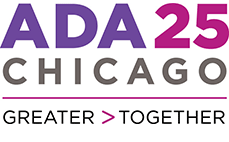 Please join us on May 22nd to discuss opportunities to improve public and open accessibility data in our community.
Please join us on May 22nd to discuss opportunities to improve public and open accessibility data in our community.
In particular, we would like to identify ways in which OpenStreetMap, the free, open, and community-built map of the world, can better capture characteristics of the built environment that impact how people with disabilities move throughout the city.
This is being done in partnership with ADA25 Chicago. ADA 25 Chicago will commemorate the 25th anniversary of the Americans with Disabilities Act in 2015 and leverage this milestone to improve the quality of life for people with disabilities—often considered the last frontier of civil rights. The Chicago Community Trust is the lead funder of this initiative.
Maptime Chicago is the local chapter of Maptime – whose mission is to open the doors of cartographic possibility to anyone interested by creating a time and space for collaborative learning, exploration, and map creation using mapping tools and technologies.
Maptime Chicago and Smart Chicago are working to both improve the data in OpenStreetMap and empower community members to contribute to and benefit from the map. We need your insight and feedback to ensure this work reaches the right members of the community and is primed to create lasting impact. We look forward to meeting with you.
The outcomes of this meeting will help Maptime Chicago and Smart Chicago plan a future Maptime event centered around adding and maintaining accessibility data in OpenStreetMap.
You can register for the event here!
Meeting Details
- When: Friday, May 22nd, 12-1:30pm. Lunch will be provided.
- Where: Chicago Community Trust (map) – 225 North Michigan Avenue, #2200. Hosted by Smart Chicago.
- Contact: maptimechi@gmail.com or smarziano@cct.org.
